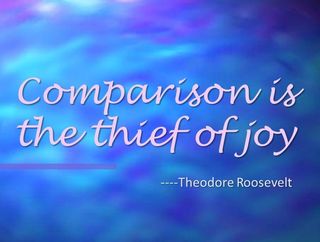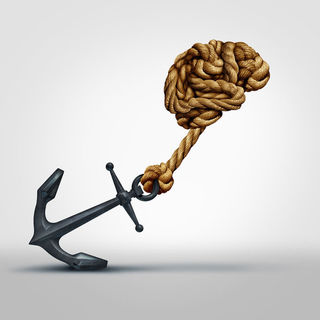Motivation
This Motivation Hack Will Instantly Alter Your Thinking
Which unconscious personal anchors feed your ego, but limit your growth?
Posted February 16, 2017

I have this friend, let’s call him Morty. I can only describe Morty as charming, intelligent, and annoying. He is charming because of his sense of humor, intelligent because he is knowledgeable about diverse topics, and annoying because he compares himself to anyone he can find. Morty is fixated on what other people do. While he performs exceptionally well in college (with a 3.8 grade point average), he questions his own accomplishments in comparison to friends, relatives, and coworkers. He is often miffed when people announce their accomplishments on social media and becomes disenchanted when others celebrate birth, marriage, and anniversaries, events that he considers predictable and mundane. Ironically, despite his success and smarts, Morty doesn’t realize that his persistent social comparisons limit his potential and negatively influence how he thinks about himself.
How many choices did you make today?
Morty, like everyone else on confusing planet Earth, is faced with literally hundreds (maybe thousands) of decisions daily. Cornell University professors Brian Wansink and Jeffrey Sabol in a study on nutrition revealed that most people make an average of 227 decisions a day on food choices alone! Decision making experts like Richard Feenstra contend that by understanding how our decisions are made, we are in a much better position to make the right decisions. When we question our choices we are often led down a treacherous path leading to feelings of self-doubt that hinder risk-taking and foster negative emotions such as depression. In this case, “right” means decisions that don’t cause anxiety or regrets and those that lead to improved evaluations of our subjective well-being.

The Anchor Hack, described fully in the new book Hack Your Motivation is designed to illuminate which benchmarks people use to determine comparisons. Your personal anchors make a huge difference in how you go about reaching your goals. The comparison process is something that everyone does, albeit we use one of three different methods. Some of us compare ourselves to our own set of guidelines and are motivated to set goals and act by besting our own past performance. Running a marathon and lowering your completion time is a good example of self-comparison. People in this category are content if they are better, faster, or accomplish more than last time. Others use societal benchmarks to set performance targets. The standards set by society are culturally determined and include things such as speed limits, passing rates, and company- or team-determined goals. Often, and quite frequently without even knowing it, people set performance targets just like Morty. They use another person as a standard, primarily to make themselves feel better about what they do or do not accomplish!
Why it matters
Points of comparison set the boundaries for our goals and behaviors. Knowing which anchor a person uses helps determine the best way to change undesirable behaviors, and knowing why a person uses social comparison can also help in the mediation process. One reason individuals compare themselves to others is because of limited information to make accurate standard comparisons. Another possibility for social comparison may be to satisfy the need for a self-serving ego boost by comparing themselves to someone they think is inferior. People also use social comparison as means of justifying their own behavior. What matters most is detecting the type of comparison, because comparison methods align with specific goal attainment strategies. As you might have surmised, when comparing ourselves with others we may not be achieving the same level of competence as we do when we compare ourselves to a defined standard.

So, whose dog is better? Social comparisons can be made in an upward or downward direction. Upward comparisons are motivationally beneficial because the comparison to someone perceived as superior will often prompt improvement. Social comparison to a downward target results in the person feeling better about themselves and is typically used by individuals lacking confidence, by persons with low levels of self-esteem, and by people who are worried about what others think about them. The downward comparison feels rewarding psychologically because of the presumption that others are more disadvantaged than the individual making the downward comparison. Biologically, downward comparisons produce the feel-good neurotransmitter dopamine because our perception of well-being is enhanced when we deem others inferior! However, there is a huge disadvantage when we make social comparisons and fail. If we believe we are inferior to the comparison target, evaluations of our own self-esteem can plummet. Our motivation to set challenging goals or attempt difficult tasks that others can perform successfully (like getting a high paying job or a college degree) may be short-circuited out of fear of failure. Often, the social comparison motive results in apathy and lack of effort because the person cannot look bad in comparison to others if they voluntarily and deliberately choose to avoid taking any action.
Put it to work
The Anchor Hack should always be a consideration for managers, teachers, and parents. If a person is using social comparison as performance anchor, they will defer to certain strategies to accomplish their goals that they otherwise would not use if they compared their results to past performance or to an established standard. Social comparison people may need extra incentives to take assertive action or to try new things because they fear a “less-than” potential outcome. Since social comparison influences self-perception, when we come up short in reality or in one’s imagination, anxiety is sure to follow. Individuals experiencing anxiety will tend to ruminate over perceived inadequacies and are less effective at thinking clearly. An effective strategy to counteract the worrisome behavior is to work with the person to set significant, attainable goals based on standards achievable with reasonable and sustained effort.
The Anchor Hack is also highly valuable for organizational effectiveness. Like individuals, some companies deliberately elect not to be in the limelight or considered industry leaders. Instead, these types of companies compare their organization to other successful firms. While this strategy does not have psychological or motivational consequences, the tactic can limit growth and innovation of organizational members who see little value in being creative when the measure of success is mimicking competitors. The hypocrisy of many organizations is in part reinforced by the reactive position of only making changes when comparing unfavorably with other “peer institutions.” This reactionary approach often fosters complacency because until directed to act by superiors, people within the organization may fail to show initiative or take action. This reactionary approach is one reason why both academic and corporate organizations struggle to survive. By the time the company realizes a change is necessary, it is often too late to alter benchmarks and recover from organizational apathy. Change your anchor and start hacking your motivation today!
---------------------------
This blog post is based on Dr. Hoffman's new book, Hack Your Motivation. For daily updates on motivation, learning, and performance, follow him on Twitter @ifoundmo.


